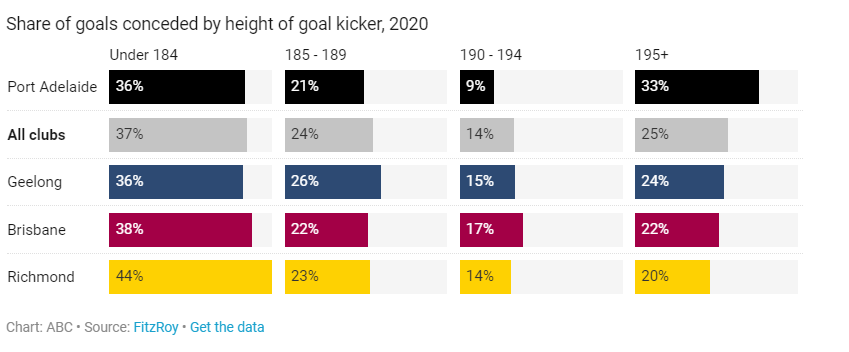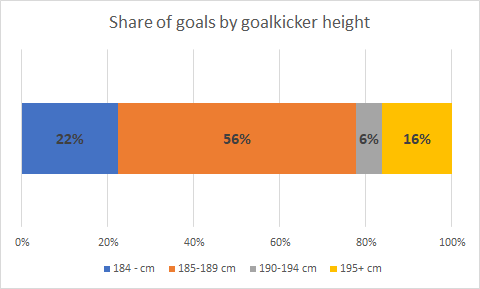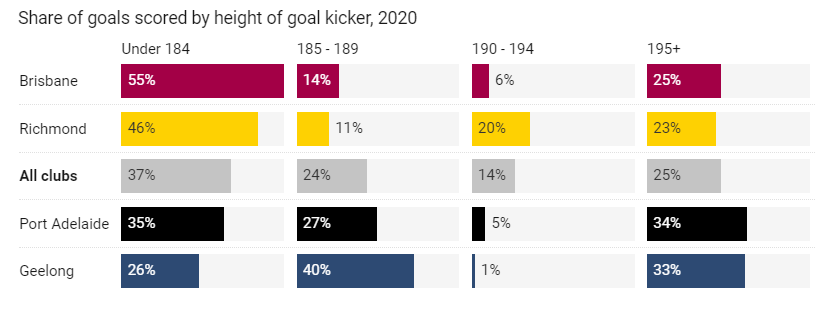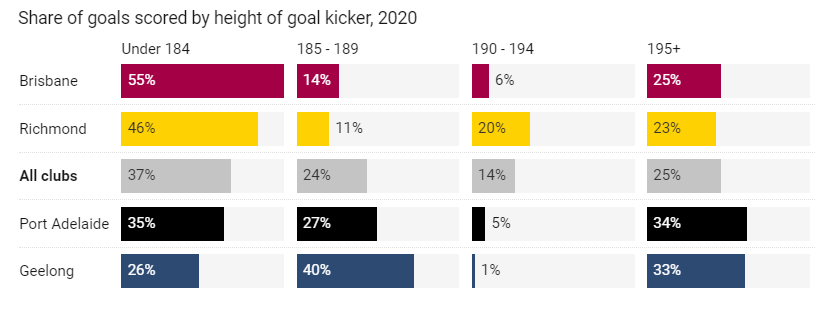Everything posted by Axis of Bob
-
Nick Hind
He's the sort of player we should be after. Not high production, but has pace, tackles and can do 2 or 3 things a game that create a score. Is older than you think .... 26.
-
WELCOME TO THE MELBOURNE FOOTBALL CLUB - BEN BROWN
I get this argument, and I agree that he's a natural forward. I think the role that best suits him is the role he played in the last two weeks as a defensive tall on intercept markers where he can use his smarts to find space on a non-defensive opponent. I'm just not convinced that his best role is the best role for his team.
- Game plans, tactics and all that jazz
-
WELCOME TO THE MELBOURNE FOOTBALL CLUB - BEN BROWN
Fixed.
-
WELCOME TO THE MELBOURNE FOOTBALL CLUB - BEN BROWN
Yikes! I'd better have another look! ?
- Game plans, tactics and all that jazz
-
Game plans, tactics and all that jazz
In 2020, when Melbourne wins the inside 50 count, we are 4 wins - 4 losses. When we lose the inside 50s, we are 5 W - 4 L. So we are more likely to win a game of football when we give up more territory and inside 50s. Bear in mind that of those 4 wins we had when also winning inside 50s, two of those were absolute shellackings over Adelaide and North. Effectively we are a better counterattacking team territory team. Or, more precisely, our forward line only really functions when it has space and fast ball movement caused by a quick transition.
-
WELCOME TO THE MELBOURNE FOOTBALL CLUB - BEN BROWN
I can see that my 'Fritsch in defence' thoughts are about as popular as COVID, so I'll try to give a bit more information to support it (although I may still skip doing so for COVID). Fritsch has received Brownlow votes twice: two votes in a tight win against Carlton at half back (26 touches, behind T McDonald who kicked 6 before being injured), and two votes in a close loss to the Eagles 2 weeks later (kicking 4 as the second tall forward). He stayed forward in every game after that and we lost them all, despite him kicking goals. He kicked goals as a key forward, with Weid and TMac both missing, rather than as a small forward. In games he has played as a forward from 2018-now, we were 13-14 with him in defence/not forward, and 16-18 with him forward. We won the game he missed this year against St Kilda in a dour defensive slog. There were some excellent articles in the 'Game Plan' thread and I saw this table from one of them, which showed the top 4 teams and their contribution of goals from different players. It shows a 'barbell' of goalkickers, where goals are mostly kicked by the talls or smalls, with few being kicked by the mediums (mostly midfieders). This makes sense, because it's so much harder to get space inside 50 in the modern game, so the goals are kicked from big marks (eg, Charlie Dixon, Tom Hawkins, Tom Lynch) or crumbing forward (eg, Robbie Gray, Brendan Parfitt, Daniel Rioli). Then have a look at ours: We kick twice as many goals from mediums as the others, and hardly any from the talls and smalls. 4 of our top 5 goalkickers were mediums (Fritsch, Petracca, Melksham, Hunt - nobody else kicked double figures other than Weideman). Fritsch kicked 22 from 16 games as our leading goalkicker, so it's clear that what we're doing isn't working. Our best wins were when we lost the inside 50 count because we could kick goals in transition (where mediums thrive) but couldn't kick goals when teams were set against us (where the tall/small setup is better). We can solve our tall issues because we have some talented players like Jackson, Weid and Petty (and possibly Brown). But Fritsch doesn't help our small forward problems because he isn't a small forward, but instead he'd be a fourth tall forward! He has shown promise as a smooth moving and flexible defender who can intercept and provide drive. I think that's the role he best serves the team in.
-
Game plans, tactics and all that jazz
Very interesting. I found this chart instructive because I think it highlights our challenges. It shows that forward lines at the moment are either small or tall, whilst ours is mid sized. Maybe there's a method to what what we're trying to do, but it's different to what the top 4 are doing. Anyway, I thought I'd try to recreate this chart for Melbourne this year: That's a very different look, with our <184cm and >195cm cohorts being less productive that any of those 4 teams. In fact, 4 or our top 5 goalkickers (Weideman aside) were between 185cm and 189cm.
-
WELCOME TO THE MELBOURNE FOOTBALL CLUB - BEN BROWN
I'm not making a judgement on anything except that using tackle stats is a terrible way to judge whether or not someone should be playing in defence. Although I will say that using third team midfielder tackle numbers is also a terrible way to judge whether or not a half forward should be played in defence. ? But half forward and half back are completely different roles. I think it's difficult to use half forward statistics as a predictor of success at half back, one way or another.
-
WELCOME TO THE MELBOURNE FOOTBALL CLUB - BEN BROWN
All Australian team 2020 Defenders: Luke Ryan: 20 tackles in 17 games. Harris Andrews: 16 tackles in 15 games. Brad Sheppard: 34 tackles in 18 games. Darcy Byrne-Jones: 32 tackles in 18 games. Darcy Moore: 14 tackles in 18 games. Nick Haynes: 23 tackles in 17 games.
-
Magpies Delist 2
Instead they combined it with others to get Gibbs. ?
-
WELCOME TO THE MELBOURNE FOOTBALL CLUB - BEN BROWN
This year Weideman took 1.31 contested marks a game. Hawkins took 1.68 and Dixon took 2.53 a game. But if you break it down, before Weideman became the number 1 forward (starting against the Bulldogs in round 13) he took 1.75 per game, whilst after that it was only 0.6 per game. His ability to jump at the ball and work one on one make him a very dangerous forward target, but he's not a wrestler at the moment and we suffer for it. Sure, he can do it, but we losing a lot of his ability as a player if you sacrifice him. In the end, I think the real elephant in the room is Fritsch, whose 'tallness' as a medium forward means that crafting a forward line with the pieces we have is very difficult. Without him you could play 3 talls (if one of them is Jackson) and let them all share the workload of contesting the long ball as a flexible trio who can all do it. But playing Fritsch forward means that you have to leave one of the 3 tall forwards out (because you can't play 3 talls plus Fritsch) and that means you probably need a single player to do most of the grunt work because they will draw a lot more of the footy against the heart of the defence. A forward line with Weid and Jackson is tall but also very mobile, but you lose that if you're asking for one of them to spend most of their game wrestling with 2 defenders. Personally, I'd have three talls (as long as Weid and Jackson were two of them) and three smalls up forward, and play Fritsch at half back. I think he's probably played his best footy at half back, even if he may think of himself as a forward.
-
WELCOME TO THE MELBOURNE FOOTBALL CLUB - BEN BROWN
In their respective age 23 seasons, Dixon kicked 24 goals from 14 games. Hawkins kicked 27 goals from 18 games, and Weideman (this year) kicked 19 goals in 13 games. You're right, he's just not big enough at the moment. Will he be? He's never been the power athlete Dixon and Hawkins are/were, but has the class that those two may not.
-
TMac on the Trade Table?
Shane Woewodin vs Melbourne (2003-2005): 3 games (1W-2L), 17 possessions per game, 0 goals, 0 Brownlow votes. His best game was the first game back, which was a behemoth 22 possession masterpiece in a game Collingwood won by 10 goals. Unluckily overshadowed for a Brownlow vote by approximately 9 other players, one of whom was Simon Godfrey. We were put to the sword.
-
Trump v. Biden
And this is why we can't have nice things in the General Discussion forum.
-
Brody Mihocek
Weideman has tricks and can win the ball if different ways, plus he actually finishes very well in general play, but he isn't physically big enough to wrestle with multiple defenders. He needs to run at the ball to mark in packs, or use his body one on one, but his lack of physical strength stops him being able to compete with multiple defenders when he can't run and jump at the ball. Mihocek also lacks this size and, whilst he is a clever player and good one on one, he still doesn't provide us with an option for the long kick against multiple defenders. You may have misgivings about Weideman as a player but you would be bringing in Mihocek to replace him, not complement him.
-
Brody Mihocek
The problem is that he's not filling a role that we are missing. He's a good second forward, but we already have a few of those (Weid, Jackson, Fritsch), but not a number 1 bail out option. He just doesn't have the size it the presence. That's why Collingwood keep persisting with Cox despite his issues. As Buckley said in his post-game press conference, those number 1 forwards are pretty hard to find.
-
Trump v. Biden
Biden is the candidate because of who he's running against. The Democratic primary was all about who was most likely to beat Trump and it's clearly Biden. Biden is the least offensive candidate to moderates and seniors who don't want a progressive reformist (like Sanders) but also can't stand Trump. Those on the left will vote for Biden anyway because the alternative is Trump, but the ones in the middle need to be motivated to vote. Plus old people vote a lot more reliably than young people, so a candidate that appeals to them is going to be really important (especially in places like Florida). It's also important when looking at the Senate races, which is probably where most of the Democrat resources will go now that Biden's strong lead looks stable.
-
Yze is a Demon Again
Greg Stafford: 141 goals 66 behinds - Accuracy 68% Adem Yze: 234 goals 194 behinds - Accuracy 55%
-
Welcome to the MFC - Maggie Caris
The other thing to remember is that her background is almost all netball, where passes are only ever made in close (especially as a shooter). So she has been trained to only look for close targets and it'll take time for her to be able to naturally adjust to the idea that targets 30m away are viable.
-
Isaac Smith
Interestingly the players that played the were generally those that could play on the outside in their later career. Brent Harvey, Kevin Barlett, Michael Tuck, Shaun Burgoyne, Robert Harvey, Craig Bradley, Adam Goodes, Brad Johnson, John Blakey, Gary Ablett, Doug Hawkins, Kade Simpson ...... Some of those were inside players at their peak, but they got the longevity by being able to play outside. That's what we're seeing with Jones, Lewis and Vince, who didn't have great pace to start with so fell away one they slowed down from 'average' to 'slow'. Isaac Smith, provided he stays injury free, will not become 'slow', but he may move from 'fast' to 'average' whilst still remaining a great aerobic athlete. Even an averagely quick Isaac Smith is still a very good wingman and should continue be for a number of years (injury dependent).
-
Jared Polec
Not true. Lake played his first game at Hawthorn as a 31 year old. https://afltables.com/afl/stats/players/B/Brian_Lake.html
-
Jared Polec
Seemed to work out OK for Brian Lake to squeeze out 3 Hawthorn premierships.
-
Jared Polec
It is strange, if true. North are in a no win situation now. It's been hard for North to land free-agents because those free agents could see that the list was right at the end of its run, and they were that good anyway. We were like that, where substantial free agents and wantaways wouldn't come because we weren't attactive. The best way to start attracting players to your club is to build a core group of players that make others think that they have a successful future. After that it's self-fulfilling because the good players now attract good players which makes them successful which attracts good players etc. But they need to just eat the [censored] sandwich for a few years so that they can build a young group that can attract others. They have an extra first round pick, so it will be interesting to see how they attack the trade period. As for what they do with Polec, I suppose that's entirely dependent on whether they think the relationship is salvageable. If they think they can then the only downside is whatever compensation we'd be offering them, which may not be much.








